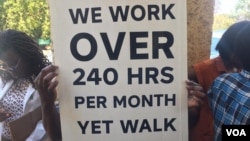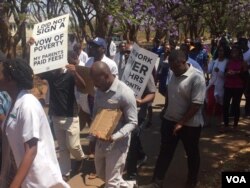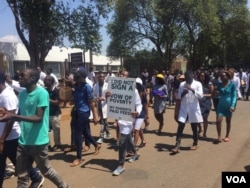HARARE, Zimbabwe – Government-employed doctors on Monday ignored a labor court ultimatum to return to work, saying they remain incapacitated by poor wages and inadequate health facilities.
Justices Lawrence Murasi and Rodgers Manyangadze on Friday ordered doctors to report for duty within 48 hours. They declared the strike illegal and referred the dispute between the doctors and the government to arbitration within 14 days.
Junior doctors have not reported for duty since Sept. 3, saying they no longer can support themselves on salaries of less than $200 a month as Zimbabwe’s economic crisis drags on. Senior doctors joined the strike last Thursday, with both groups also complaining that health facilities lack the equipment and medical supplies needed to treat patients.
Dr. Tawanda Zvakada – acting secretary general of Zimbabwe Hospital Doctors Association, which initiated the strike – told VOA’s Zimbabwe Service that the group’s lawyers were preparing to challenge the ruling. It could be appealed to Zimbabwe’s Supreme Court.
Masimba Dean Ndoro, the association’s acting vice president, says physicians still lack resources to report for work.
“Doctors simply do not have the means to attend to their duties,” Ndoro said.
The strike has crippled the health sector, exacerbating suffering for the sick and injured in the country of southern African country of 14 million. While private doctors have not joined the strike, their higher fees put them out of reach for most people.
The government’s health minister, Obadiah Moyo, was not available for comment. Dr. Paulinus Sikosana, who chairs the Health Services Board, has threatened to withhold pay from striking doctors.
In early October, doctors rejected the government’s offer of a 60% increase. It would have been paid in the country’s devalued currency, not the U.S. dollars that the doctors claim their contracts require.
NEGOTIATION URGED
Davies Ndumiso Sibanda, an independent labor expert based in Zimbabwe’s second-largest city, Bulawayo, called for the government and doctors to resolve the case amicably without involving the courts.
“With labor disputes, it doesn't matter who wins it,” said Sibanda, citing his 28 years of legal experience. He noted that in the most recent court decision, “the employer has won, but it still doesn't have the doctors in the hospital — which is a clear sign that this is a problem not capable of being resolved through litigation.”
Instead, Sibanda urged the parties to systematically address each grievance – such as wages and the cost of living, and shortcomings in medical supplies – and set a timetable for resolving them.
If the case went to the Supreme Court, it could drag on, Sibanda warned, and “what it means is people are continuing to die in hospitals.”
MAGOMBEYI ‘RECOVERING WELL’
Meanwhile, Zvakada of the doctors association told VOA that one of the strike’s early leaders is “recovering well” in South Africa.
Dr. Peter Magombeyi allegedly had been abducted from his home September 14 and was found outside of Harare several days later. Zimbabwe police later temporarily blocked Magombeyi’s departure from a private clinic in the capital, where he was being treated for undisclosed ailments, but relented after a high court’s order. Magombeyi was transferred to a clinic in South Africa and now is at a safe house, Zvakada said.
Some civil society groups have alleged that Magombeyi was abducted by state security agents, but Zimbabwe’s government has denied any involvement.
Rutendo Mawere reported from Harare, Zimbabwe; Gibbs Dube of VOA’s Zimbabwe Service and James Butty of VOA’s English to Africa Service reported from Washington.






